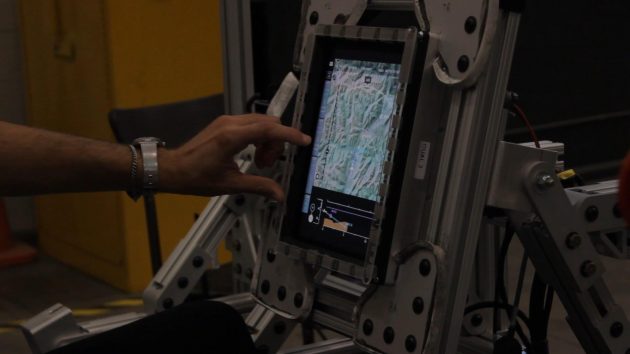
Mitacs Globalink intern developing flight deck for aircraft pilots
by CM Staff
The team’s early research indicates that the overall error rate of cockpit touchscreens is 13 percent on average, but can rise to 20 percent as vibrations from turbulence worsen.

Cockpit simulator dashboard at the Polytechnique Montréal (Mitacs)
MONTREAL — Border closures and international travel restrictions aren’t stopping some of the world’s top talent from collaborating with Canadian researchers this summer. Relying on video calls and other advanced technology tools, more than 1,000 students from 12 countries are working on leading-edge research at 54 Canadian universities through an internship program called Mitacs Globalink. One of those rising young stars is an engineering researcher from France who is helping a Polytechnique Montréal lab to design the flight deck of the future, creating a unique cockpit touchscreen that is easier and safer for aircraft pilots to use — all from the comfort of his home near Paris, France.
Arthur Camille Bevier, a 23-year-old Master’s student at Université Paris-Seine, is working remotely from home under the guidance of Assistant Professor Philippe Doyon-Poulin at Polytechnique Montréal. Combining his personal experience as a recreational pilot with his engineering specialization in aeronautics and computer science, Bevier is working to understand the issues pilots face as they attempt to enter flight information and other mission-critical data on a touchscreen during flight, and to come up with a design that is better suited to aviation.
“Manufacturers want to bring the efficiency of touchscreens to the cockpit, but as they start to do so, they are encountering problems related to turbulence and vibration, as well as user discomfort,” explained Doyon-Poulin, noting that anyone who has tried to text a friend while riding as a passenger in a car or on a bus will understand firsthand how difficult it can be to use a touchscreen when your hand is shaking.
Working in collaboration with industrial partner CMC Electronics of Montreal, Bevier’s research builds on a project started by former Mitacs intern Adam Schachner, who successfully designed a test area in the university’s lab that uses an immersive 4D seat to mimic the vibration of an aircraft. After consulting with CMC Electronics engineers to gain a better understanding of the constraints facing pilots when using touchscreens, Bevier analyzed more than 75,000 data points collected by Schachner from 23 participants who were asked to perform various touchscreen tasks under specific vibration conditions while seated in the lab’s specially-designed test area.
The team’s early research indicates that the overall error rate of cockpit touchscreens is 13 percent on average, but can rise to 20 percent as vibrations from turbulence worsen and up to 40 percent as buttons or widgets on the screen get smaller. Their next step is to test all three prototypes designed by Bevier in the lab to compare results and establish which is most stable for use in flight. Once published, they will pass their findings on to CMC Electronics to improve future avionics designs.
Bevier is one of 1,075 students — from Brazil, China, France, Germany, Hong Kong, India, Mexico, Taiwan, Tunisia, Ukraine, United Kingdom and United States — who are taking part in the Mitacs Globalink Research Internship program this summer to help solve complex problems across a range of industry sectors, from healthcare and wellness, to robotics, technology and the environment.
“Canada now ranks third in the world in attracting international students, with a staggering 642,000 students here on study permits last year alone, and Mitacs is proud to play a key role in continuing to accelerate these efforts, even in the face of a global pandemic,” said Mitacs CEO and Scientific Director John Hepburn, noting that Canada’s international student base tripled in the last decade and is now six times higher than it was at the start of the millennium. “Mitacs Globalink not only helps to advance innovation across all industry sectors through global research collaborations, but it also boosts our economy and helps attract some of the world’s best students to our universities for advanced degrees.”